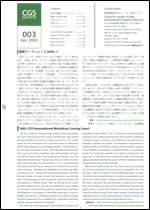
The third issue of the CGS Newsletter is now available both in print and online. Click the URL to download the PDF version.
April 2005 Archives
ICU Center for Gender Studies marks its first anniversary this April, having grown to a large membership with twenty faculty members and thirty students involved. Our center space has also grown to be functional place for students and members to get together. Our activities for the last year have been various. We organized many lectures and casual lunchtime meetings with splendid lecturers invited from inside and outside the university. Our first international workshop was held 25-27 November 2004 on Human Security and Gender in Asia, and saw lively and reciprocal discussions by researchers and activists from 10 Asian countries. Though, the definition of security may differ according to one's cultural and historical background, we agreed upon the mutual understanding that women's security have been overshadowed by the concept of national security and its emphasis on military power. We are glad that we have created an intimate network among gender researchers regardless of language and nationality. This experience will prove valuable for CGS. In June 2005, CGS is going to attend the women's conference, WW05, in Seoul, and to host a panel discussion on the possibility of cooperation between academia and activists.
The First International Workshop by CGS is approaching on 25th Nov. Thirteen researchers are to convene from nine regions and nations which are Bangladesh, China, Hong Kong, India, Indonesia, Korea, Malaysia Philippine and Thailand and discuss on the theme "Human Security and Gender in Asia" for three days. The proceedings of this workshop will be published on the web and booklet at the beginning of March.
ICU Division of International Studies : Tanaka, Kazuko
The CGS Book Club was started in April this year as an initiative of the newly-established CGS. It is a reading group run by students which is open to anyone interested in gender and sexuality. So far, our members have included professors, undergraduates, and graduate students from different disciplines. Our debates are always lively and the atmosphere is fun and laid back. This term we have 20 members and we're reading Judith Butler's Gender Trouble. Come and join us!
CGS Staff : Asakura, Chikaho
The Interdisciplinary Program in Gender and Sexuality Studies provides a model curriculum for students who wish to create an interdisciplinary major that focuses on issues of gender and sexuality. Human experience is inextricably linked with sex and gender. We enter the world with the biologically defined sex of our bodies and then over the course of our lives become gendered social actors. In doing so, we encounter and engage the wide array of socio-cultural ideas, values and practices that define gender, with its associated ideas regarding masculinity, femininity, and other gender identities. In recent decades scholarly research in multiple disciplines has explored the profound ways in gender and sexuality are constructed and defined in social life and also influence and inform social action. This research has demonstrated not only the centrality of sex, gender, and sexuality in social life, but also their critical linkages to such basic everyday issues as access to education, language use, and political participation, or such large scale theoretical issues as inequality, class, power, and nature versus nurture debates.
Being gay is simply not a Gender Identity Disorder (GID), as I so would love to believe. Being one is beyond the bound of natural or supernatural hypothesis. Being one is not chosen. You know you are gay when you feel like one.
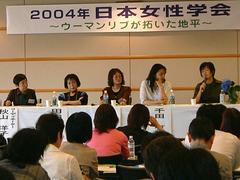 On the 12th and 13th of June, 2004, I was in Kurayoshi, TOTTORI, to attend the conference of the Women's Association of Japan for the first time. It was held in a beautiful hall, built by some designer, in a historic town of Kurayoshi. As was the hall itself, the atmosphere of the conference was very warm and welcoming. Though I was the first-timer, they accepted me as if I were a member from long ago, and I felt at ease immediately. This warm hospitality was maintained throughout the venue. Speakers were given encouraging opinions and proper suggestions from the audience. The message was clear: we go forward together, helping one another.
On the 12th and 13th of June, 2004, I was in Kurayoshi, TOTTORI, to attend the conference of the Women's Association of Japan for the first time. It was held in a beautiful hall, built by some designer, in a historic town of Kurayoshi. As was the hall itself, the atmosphere of the conference was very warm and welcoming. Though I was the first-timer, they accepted me as if I were a member from long ago, and I felt at ease immediately. This warm hospitality was maintained throughout the venue. Speakers were given encouraging opinions and proper suggestions from the audience. The message was clear: we go forward together, helping one another.
The Law for the Prevention of Spousal Violation and the Protection of Victims was amended in May 2004. It will be enforced in this December. The major changes are as below: (1) the extension of the period of Vacation Orders from 2 weeks to 2 months, which the court orders to the assailant, (2) the inclusion of children to the protection by the prohibition against approaching a victim, (3) determining the promotion of the victims become self-reliance under the responsibilities pf local government, and (4) the inclusion of mental violence to the definition of domestic violence, which used to refer only to physical violence.
Dowry has become a very common word and it is practiced in Indian society without any inhibitions or ill feelings. Dowry is a payment from the bride's family to the groom or groom's family at the time of marriage. Upon marriage, daughters are given all modern household gadgetry as dowry such as furniture, crockery, electrical appliances (in recent years refrigerators, television etc.) as well as personal items of clothing, jewellery and cash. Some parents also give a car among dowry items. The value of the dowry depends on the jobs the grooms may be holding at the time of marriage, ranging from 250,000 Yen to 5 million Yen or more in a country where a basic graduate's salary starts from 6,250 Yen (with the exception of medical and engineering graduates.) The fact is that no good alliance can be made without offering the above-mentioned gifts. This system is more rigid in the northern Hindi-speaking region consisting of Bihar, Uttar Pradesh, Rajasthan, and Haryana states, although it is against the law. The Dowry Prohibition Act of 1961, amended in 1984 and 1986, treats the offence of dowry as cognizable and non-bailable, giving and taking dowry is prohibited, cruelty of others to the woman driving her to suicide is punished. Inquiries are made into any woman's suicide or death in suspicious circumstances within seven years of her marriage. You can find a lot of information on this social evil on the Internet and in books available on women's issues in India. In fact, there are a number of books available in our ICU library itself. In this paper, I would like to mention my own family's experience regarding dowry at the time of my elder sister's marriage.
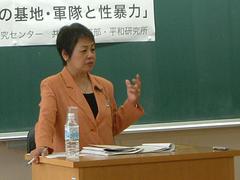 What does Okinawa remind you of? It may be the sea so blue and so clear, Shuri Castele, a characteristically Okinawan market, or even an old-fashioned family, warm and somehow nostalgic, which is now getting harder to find in contemporary society. So may it be U.S. military bases, or clubs nearby.
What does Okinawa remind you of? It may be the sea so blue and so clear, Shuri Castele, a characteristically Okinawan market, or even an old-fashioned family, warm and somehow nostalgic, which is now getting harder to find in contemporary society. So may it be U.S. military bases, or clubs nearby.
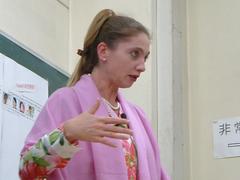 Ms. Claudia Derichs delivered a lecture titled "Comparative studies of female politicians in Asia" on May 12th at International Christian University.
Ms. Claudia Derichs delivered a lecture titled "Comparative studies of female politicians in Asia" on May 12th at International Christian University.
Ms. Derichs is an assistant professor of University of Duisburg in Germany and is a member of a research project "Dynasties and Female Political Top Leaders in Asia". This project investigates twelve female political leaders from ten Asian countries and started in 2003 in Germany planed to be finished in 2005. In the lecture, Ms. Derichs explained the project.
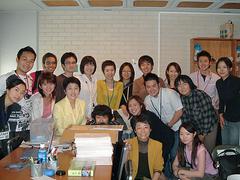 On the seventh of May, 2004, CGS held a lecture titled "Marriage, Family and Gender" in commemoration of its opening. The lecturer was Fukushima Mizuho, who worked for the cases of sexual harassment and domestic violence as a lawyer. Now she vigorously wrestles with the passing of the registration that allows married women to have the choice of keeping their own maiden names. She also exert and effort for abolishing the discrimination for love children. "as my hobby, reasons for life and practical benefits, I will act out", being a member of the House of Councilors and the Social Democratic Party head, Ms. Fukushima clams.
On the seventh of May, 2004, CGS held a lecture titled "Marriage, Family and Gender" in commemoration of its opening. The lecturer was Fukushima Mizuho, who worked for the cases of sexual harassment and domestic violence as a lawyer. Now she vigorously wrestles with the passing of the registration that allows married women to have the choice of keeping their own maiden names. She also exert and effort for abolishing the discrimination for love children. "as my hobby, reasons for life and practical benefits, I will act out", being a member of the House of Councilors and the Social Democratic Party head, Ms. Fukushima clams.
"If you do not contribute to the army, you are not a man" I was shocked to hear this from my Korean friend's mother. I had been in South Korea last year as an exchange student to Ewha Womans University. Ewha is a woman's school as it can be seen by the name, but men can also study if they use exchange program. A few months had passed since I arrived at Korea and I was beginning to realize many similarities between Korea and Japan, so I felt a feeling of discomfort. For example, in terms of language, word order is the same, and particle such as wa, ga, wo, mo are used the same. The concept of "man" however, is quite different in Korea and Japan. Then, why is "man" perceived different?
The official announcement made in July, 2004, reported that the average number of times a woman give birth during her lifetime fell to a new record low of 1.29. As far as I remember, the term "1.53 shock" was all over the newspapers in the beginning of 1990's, and the intellectuals were literally very shocked that they could not even hide their disappointment:"now the declination of Japanese population is undoubted." It is to my surprise that almost nothing had done by taking advantage of "useful women's opinion" against such serious social problem of human reproduction in more than a decade since then. Certainly, it is a matter of congratulation that making choice of not to have any children has been becoming approvable in society. However, here I dear to focus on the circumstance that makes women who are "interested in having one or more children" feel "they cannot" in spite of their thoughts.
Following the establishment of the Japan Society for Gender Law last year, a new movement has also arisen in the field of Economics. On the global level, the International Association For Feminist Economics (IAFFE) was established in 1992. Through this association, many issues are being debated, such as the structural change in socio-economic systems, the effects of policies on women, globalization, and the economics of caring. I can still remember my excitement as I read about the activities and research conducted by the IAFFE, in Yoshiko Kuba's Economics and Gender: New Development of Feminist Economics. I was thrilled and realized, "This is where the economics for me will be created."